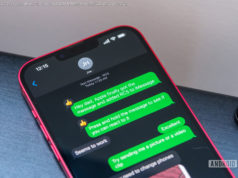Without Apple buying its 5G modems in annual volumes greater than 200M units, Intel had little chance of staying afloat in competition with Qualcomm. However, the Open Handset Alliance of Android phone makers is the bigger casualty of the deal, because they’re losing the strongest marketing point they’ve had to rival iPhones in ten years: exclusive access to Qualcomm’s leading 5G modem chips.
–A+EditorialEditorial: The big loser in the Apple – Qualcomm settlement isn’t Intel, it’s Android
By Daniel Eran DilgerWednesday, April 17,2019,05:36 am PT (08:36 am ET)Without Apple buying its 5G modems in annual volumes greater than 200M units, Intel had little chance of staying afloat in competition with Qualcomm. However, the Open Handset Alliance of Android phone makers is the bigger casualty of the deal, because they’re losing the strongest marketing point they’ve had to rival iPhones in ten years: exclusive access to Qualcomm’s leading 5G modem chips. The biggest loser in Apple’s Qualcomm deal isn’t rival Intel, but Qualcomm’s existing customers who lost their exclusive position over AppleFor Intel, relief
After Apple and Qualcomm announced their surprise settlement, it may have appeared that Intel would suffer most from the deal.
Intel immediately bowed out of the 5G modem business, effectively giving up on mobile Baseband wireless chips the same way that it had been forced out of any realistic position in selling mobile Application Processors in a market dominated by Apple, Qualcomm and the other phone makers building their own Application Processors, including Samsung’s Xynos and Huawei’s Kirin.
But Intel was certainly already aware that there was some risk of Apple and Qualcomm settling. There was also perhaps an even greater risk in Intel being lined up to continue as Apple’s exclusive modem supplier despite serious doubts that it could deliver a 5G solution on schedule. Additionally, there was also strong evidence that within a couple of years, Apple would eventually develop its own modems—an internal Apple modem effort has been no secret for years.
Intel’s concerns about sinking substantial capital into a business that the bottom could fall out of at any moment likely means that the finality of the deal between Apple and Qualcomm came as a relief. Intel can now immediately pivot to other opportunities that aren’t dependent upon the whims of an external decision, whether by Apple or from the court reshaping the 5G chip licensing business. In fact, Intel has no other option. And there’s no decision that easier to make than one where you don’t have any other viable alternative.
Intel leaving modems is like Microsoft leaving Windows Mobile or Google leaving Android tablets and Chrome OS Pixel notebooks. For Android makers, panic
On the other hand, Android makers have been collectively promoting Qualcomm’s marketing that has portrayed Apple as being behind and mired in uncertainty, not only with future chips supporting 5G connectivity, but also with today’s modems. Apple currently sells 1 Gigabit modems in a world where Qualcomm markets 1.2 Gb at the top of the line.
Qualcomm has claimed an edge in transmission speeds and general sophistication over the Intel chips Apple has been limited to using in its top of the line iPhones, thanks to the legal squabbles that have built between Apple and Qualcomm over the past couple years.
Suddenly, the one or two years of 5G exclusivity–and Qualcomm exclusivity—that Android makers and their media promoters have been trying to turn into a major issue—has vanished into nothing. Even analysts including UBS will need to find another reason to stoke fears about Apple’s future. All those months of safely being able to trumpet the news that Apple’s best iPhones have some easy-to-point-at disadvantage have vaporized. All these companies just lost their 5G exclusivity with Qualcomm to Apple
The idea that every Android flagship by the end of 2019 will be outfitted with 5G chips isn’t much of a selling point, given that there are currently no usable 5G networks anywhere that matters. But the idea that Apple was stuck at a disadvantage and would continue to be mired in uncertainty for an unknown number of years was the best possible marketing line Android enthusiasts could have hoped for—and now it’s gone.
Just as 5G was becoming an ever larger subject of discussion, Apple’s deal with Qualcomm means that there isn’t any credible fear, uncertainty or doubts that anyone can raise about whether Intel—or Apple itself—can ever catch up to Qualcomm. That FUD was critical in erecting a tower of legitimacy for Android as being exclusively advantaged in neatly packaged marketing that was created and distributed by Qualcomm itself. Android vendors didn’t even have to pay for it. CNET was quick to carry water for Qualcomm
Now that Qualcomm is back to supplying Apple its modems in a completed deal, the conversation turns back to issues like data privacy, security, usability, enterprise adoption, exclusive iOS software and games—including Apple Arcade—and a series of other factors that firmly return Android to looking like its just that hobbyist platform that serves little purpose outside of producing massive numbers of low-end devices for poor people in developing nations.
Home
United States
USA — IT Editorial: The big loser in the Apple – Qualcomm settlement isn't Intel,...






